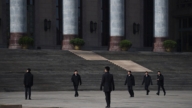【新唐人2013年03月27日訊】中共與俄羅斯簽署兩份重大軍售框架協議,中共將購買24架俄羅斯蘇-35戰機(SU-35)和四艘拉達級AIP潛艇。而有關協議在習近平訪問俄羅斯前已簽署。據了解,這是時隔近10年後,中共首度向俄羅斯採購重大軍事技術裝備。是甚麼原因導致這場軍售呢?下面我們一起來看看專家的分析。
據中共喉舌《央視》新聞《今日關注》報導說,俄羅斯向中國出售的拉達級AIP潛艇靜音能力十分突出,這4艘潛艇其中兩艘將在俄羅斯建造,另外兩艘在中國建造﹔而中國向俄羅斯採購的新型蘇-35戰機,被認為是最接近五代機的四代機。在中國隱形戰機服役前,蘇-35可有效減輕中國的空防壓力。
預計在未來,中、俄兩國還將達成更多新的軍事技術合作合同,如S-400遠程防空導彈,117S大推力發動機、伊爾-476大型運輸機和伊爾-78空中加油機等。
那麼,是甚麼原因促成這場十年未見的軍購呢?
美國中文雜誌《中國事務》總編輯伍凡認為,有兩個因素,一個是,俄羅斯為了做生意,一個是,為加強和習近平新上來的這批人的關係。
《中國事務》總編輯伍凡:「習近平要走的是共產主義道路,蒲亭要走蘇聯的道路,所以這兩個在政治上,比較接近,軍事上可以做一些合作,它開放國防部指揮中心讓習近平去看,也就是想拉攏這個習近平。所以中國和俄國現在的軍事關係,比過去略微近了一點。」
而俄羅斯《生意人報》(Kommersant)3月初報導這則消息時,轉述俄羅斯《武器出口》雜誌主編安德烈‧弗羅洛夫的論述,他說,中共之所以大量進口蘇-35戰機,可能與中共國防工業系統的技術瓶頸有關。中共研製和生產的國產第4代和第5代殲擊機,恐怕遇到困難。
時事評論家文昭則認為,中、俄簽定軍購大單的下一步,就是雙邊貿易額的增長,雙方在經濟上的聯繫因此加強。還有一點,就是加強了政治上的協調。
時事評論家文昭:「這個軍購合同的政治意義比較大,就是說它是為所謂的中國戰略協作夥伴關係,開了一個頭彩,本身把先進武器出售給中國,出售給中共政權,這是俄羅斯對所謂的,戰略夥伴關係,相當於表達了一份心意,對中共來講,也是送上一筆採購訂單、送上一份禮。」
此外,文昭指出,中共最想從俄羅斯取得的軍事技術,不是硬體的裝備,而是技術轉移。如果從飛機的角度來講,就是飛機的發動機技術和雷達技術。文昭認為,從俄羅斯本身來說,軍工部門可能不贊成軍購。
文昭:「(中共)想取得技術轉移為最終目地,這個意圖一直是很明顯的,所以比較先進武器的軍售,在俄羅斯國內一直有抵制,這也是為甚麼過去這麼多年以來,大的軍事採購,俄羅斯一直沒有給中國,但是,這次它(中共)打開了,就是說,最近十年,它(俄羅斯)又再次出售先進武器,那這本身就是一種政治上的表態。」
文昭表示,中共會進行所謂的反向研究,也就是「山寨」的複製技術。所以,軍購這個問題比較敏感,俄羅斯出售武器給中共,將造成俄羅斯軍工產業的知識產權流逝。
2008年,俄羅斯推出的蘇-35戰機,是最先進的戰鬥機機型之一,這種機型的戰鬥機,與中共曾大批採購最後自行「克隆」的蘇-27(殲11),設計上有許多相似之處。
伍凡指出,俄國人一直防著中國,中俄關係並不是人們所講的那樣,是鐵哥們或者軍事戰略同盟。伍凡強調,俄國最終還是會留一手,不會把最好的武器賣給中國。
此外,伍凡說,中、俄巨額的軍售項目,目前還只是框架協議,未來很有可能出現變數。
採訪編輯/常春 後製/薛莉
Analysis: China-Russia Arms-Sale Agreement
The Chinese regime and Russia have signed
two important arms-sale contracts.
China is buying 24 of the Sukhoi Su-35 fighter planes
and four Lada-class AIP submarines from Moscow.
Chinese state media says the deals were signed
before Xi Jinping visited Russia.
Sources say it’s the first time in nearly a decade that China
bought large military technological equipment from Russia.
So what caused the arms sale?
Let’s take a look at some expert analyses.
The Chinese Communist Party(CCP)’s central television
reported that the Lada-class AIP submarine’s silencer ability
is very prominent—two submarines are to be built in Russia
and the other two in China.
The Su-35 plane is a 4th generation fighter;
classified as being closest to the 5th generation.
Reports say Su-35 can effectively reduce the pressure
on China’s air defense before it’s stealth fighters come online.
It predicted that China and Russia will sign more
new military technical cooperation contracts;
e.g. the S-400 air defense missile, the Saturn 117S engine,
the IL-476 aircraft carrier and the IL-78 air refueling tankers.
So, what’s the reason for the CCP’s purchasing of weapons
from Russia after a decade?
Wu Fan, Chief Editor of US-based China Affairs magazine
makes some comments.
Wu gives two factors—firstly, Russia wants the business,
and secondly, Russia wants to strengthen its relationship
with Xi Jinping’s new leadership.
[Wu Fan]: “Xi Jinping wants to follow the road of
communism, and Putin wants to go the Soviet Union’s way.
These two ways are close politically,
and in the military area, they can cooperate.
Putin opened the defense center for Xi’s visit
in order to win Xi over.
Thus, now both countries’ military relations
are slightly closer than that in the past.”
Russia’s Kommersant newspaper reported in early March—
citing editor-in-chief Andrei Frolov of Russia’s Arms Exports
magazine—that the reason the CCP bought the large Su-35
fighters may be related to China’s defense industry crisis.
The 4th and 5th generation fighter that China is trying
to develop, may have faced difficulties.
Wen Zhao, a current affairs commentator, believes that
after China and Russia’s signing of contracts,
the next move will be to increase their bilateral trade volume,
strengthening economic relations and the political coordination for both.
[Wen Zhao]: “The purchase deals
have big political meanings;
they serve as part of China’s so-called strategic partners’
relationship —it’s a bonus for the first move.
Putin sold advanced weapons to China’s communist regime
—it’s equivalent to Russia sending a gift to a strategic partner and as for the CCP,
they will be sending large trade orders as their gift to Russia.”
Wen says the CCP’s first wish is to get technological military
knowledge from Russia, but not the hardware equipment,
and to transfer Russia’s technology—e.g. for aviation,
they need the plane’s engine and radar technologies.
Wen believes that Russia’s military-industry sectors
may not agree the arms-sale.
Wen Zhao: “To transfer Russia’s technology is China’s
ultimate goal, and this intention is very obvious.
Russia has always rejected the sale of advanced weapons;
for over a decade, Russia has not sold heavy arms to China.
Yet, this time the door has been opened and Russia has sold
advanced weapons to China, indicating its political stance.”
Wen says the CCP will be studying the bought technological
knowledge, and creating “counterfeit” copy technology.
Thus, weapon sales is a sensitive topic; Russia’s sale to China
will cause its military-industry a loss in weapon intelligence.
In 2008, Russia launched its Su-35 fighters,
as one of the most advanced fighter models.
And the CCP purchased and cloned Russia’s Su-27,
creating the F-11, with its many similar designs.
Wu Fan says Russia has been cautious, and the Sino-China
relationship is not one of “strategic partners” as some say.
Wu emphasizes that Russia will certainly hold back,
and will not sell its best weapons to China.
The huge arms sales is only a framework agreement
and may change in the future.

























